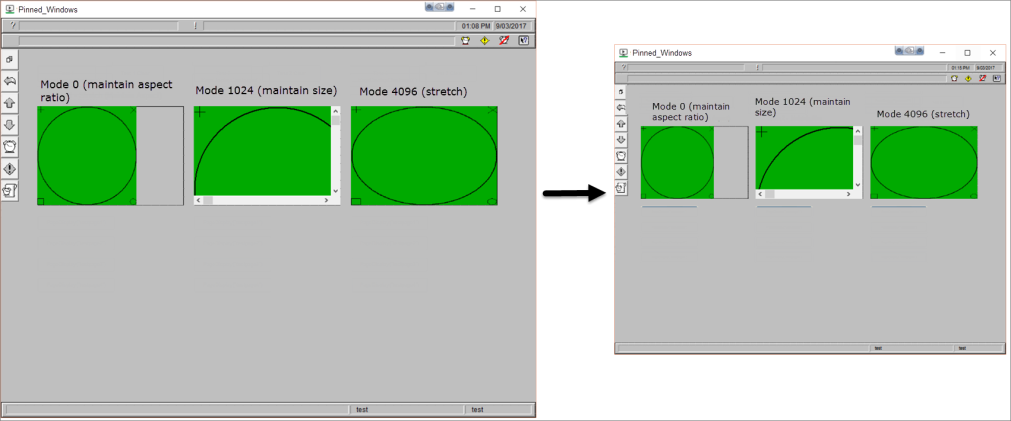
Allows for windows to be "pinned" at specified locations within a main window or within other pinned windows. This function opens a new display window at a specified location, relative to the current active window, with a selected page displayed. The window can later be removed with the WinFree() function.
The pinned windows become child windows of the parent window, and maintain their size and position relative to the parent window.
Pinned windows do not have a border, title bar or title. They cannot be maximized or minimized. Pinned windows are automatically closed when the main window is closed. They can be created in one of the following modes (as detailed in the Syntax section below).

The content of pinned windows can be manipulated using most Windows Cicode functions except the following:
Note: This function is not supported in the server process in a multiprocessor environment. Calling this function from the server process results in a hardware alarm being raised.
You can also specify if the displayed page operates within the context of a particular cluster in a multiple cluster project. When the page is displayed during runtime, the ClusterName argument is used to resolve any tags that have a cluster omitted.
Note: When executing a keyboard command while the focus is in a pinned window, the keyboard command will first be matched against the list of keyboard commands associated with the graphics object that has current focus, and then the list of keyboard commands associated with the pinned window page itself. The keyboard command will then be matched against the list of keyboard commands associated with the parent of the pinned window, and so on. Command execution will stop at the first object or page that matches the keyboard command sequence.
Syntax
WinNewPinAt(Page, X, Y[, Mode][, Width][, Height][, sClusterName])
Page:
The name or page number of the page to display (in quotation marks ""). Can be prefixed by the name of a host cluster, that is "ClusterName.Page". This will take precedence over the use of the ClusterName parameter if the two differ.
X:
The x pixel coordinate of the top left corner of the window.
Y:
The y pixel coordinate of the top left corner of the window.
Mode:
The mode of the window:
0 - Set by default. Normal page, maintain aspect ratio when resized. The aspect ratio defines the relationship between the width and the height of the window.
1024 - Disables dynamic resizing of the new window.
4096 - Allows the window to be resized without maintaining the current aspect ratio. The aspect ratio defines the relationship between the width and the height of the window, which means this setting allows you to stretch or compress the window to any proportions.
8192 - Text on a page will be resized in proportion with the maximum scale change for a resized window. This option overrides the setting of the [Page] ScaleTextToMax parameter.
You can select multiple modes by adding modes together.
Width:
The pixel width of the window, scaled relative to the current active window.
Default value - The width of the page associated with argument 'Page'.
Height:
The pixel height of the window, scaled relative to the current active window.
Default value - The height of the page associated with argument 'Page'.
sClusterName:
The name of the cluster that will accommodate the page at runtime. This is optional if you have one cluster or are resolving the page via the current cluster context. The argument is enclosed in quotation marks "". If the Page parameter is prefixed with the name of a cluster, this parameter will not be used.
Return Value
The window number of the window, or -1 if the window cannot be opened. Be aware that this is not the same as the window handle returned from the WndFind() function.
Note: A common cause of the window not being created is because you have reached the maximum allowable windows, which can be changed via the parameter [page]Windows.
Related Functions
Example
Here is a Cicode example that creates three pinned windows using the current window as the parent:
INT windowPin1 = -1;
INT windowPin2 = -1;
INT windowPin3 = -1;
INT windowParent = -1;
FUNCTION MyPinnedLayout()
IF windowParent = -1 THEN
windowParent = WinNumber();
END
IF windowParent <> -1 THEN
WinGoto(windowParent);
windowPin1 = WinNewPinAt("page1", 0, 0, 0, 100, 100);IF -1 = windowPin1 THEN
Prompt("WinNewPinAt failed with error: " + ErrMsg(IsError()));END
WinGoto(windowParent);
windowPin2 = WinNewPinAt("page2", 100, 0, 4096, 100, 100);IF -1 = windowPin2 THEN
Prompt("WinNewPinAt failed with error: " + ErrMsg(IsError()));END
WinGoto(windowParent);
windowPin3 = WinNewPinAt("page3", 0, 100, 1024, 200, 100);IF -1 = windowPin3 THEN
Prompt("WinNewPinAt failed with error: " + ErrMsg(IsError()));END
WinGoto(windowParent);
END
END
See Also
Published June 2018